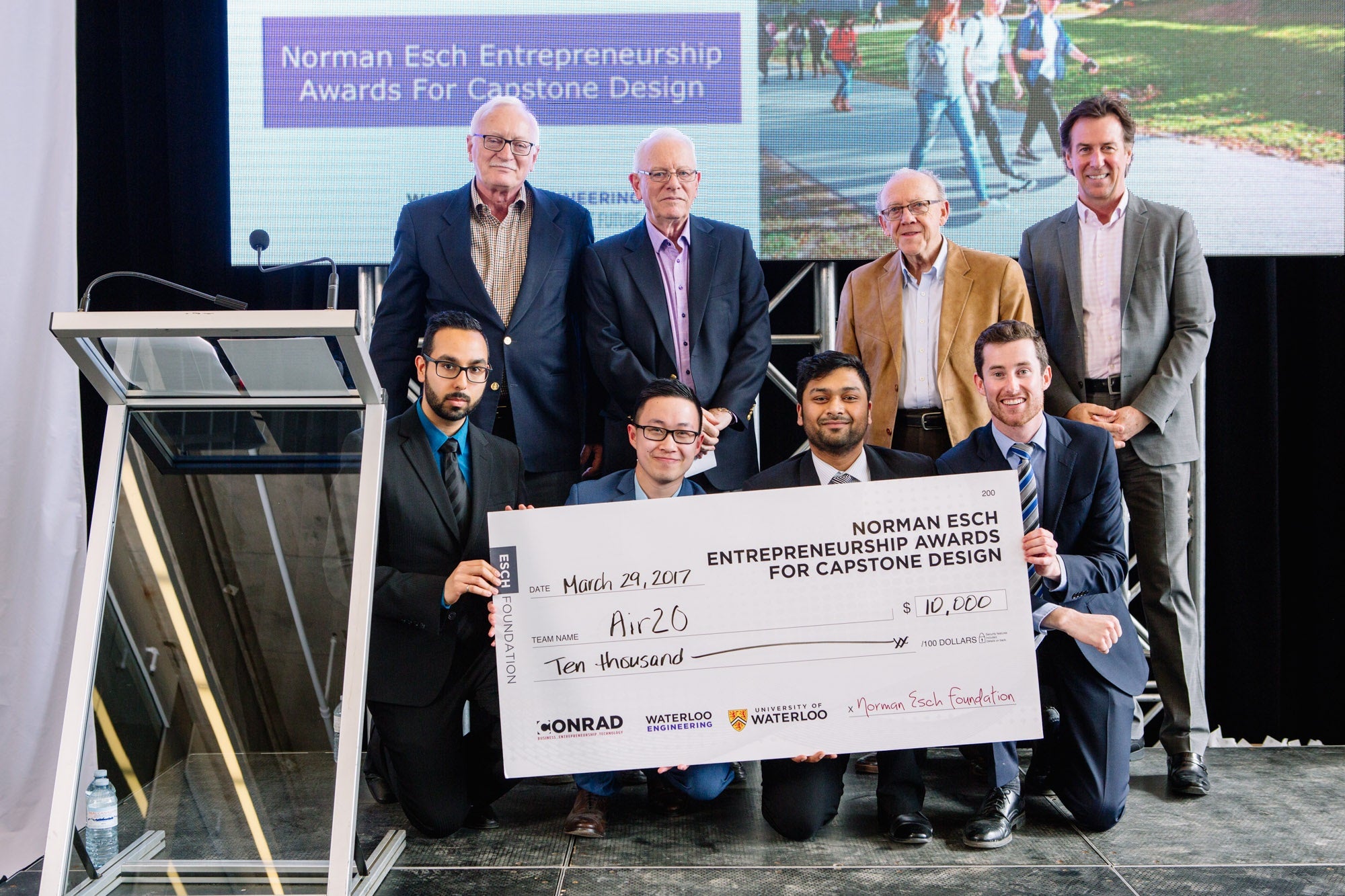A scene from Star Wars and iced coffees from Tim Hortons provided inspiration for one of six winning projects pitched by University of Waterloo engineering students this week at the Norman Esch Capstone Design Awards competition.
The four chemical engineering students behind Air2O used their 90 seconds in the spotlight at the Sedra Student Design Centre to outline work on an inexpensive device made from recycled materials to extract drinkable water from the air in developing countries.

Members of Air2O (bottom, left to right) Suhail Lakhani, Ryan Jung, Mohammad Ziauddin and Ryan Fahey pose with Esch Foundation trustees (top, left to right) David Esch, Jim Sharples, Ross McGovern and Larry Barrett.
Giant cheque for $10,000 in hand after the results were announced, team members said the seeds for their idea were planted by watching Luke Skywalker use an atmospheric water generator in the original Star Wars movie and seeing pools of condensation form around their Iced Capps in class.
“We were like, ‘Is this actually feasible?’” said Suhail Lakhani. “Can we actually generate water like they did in Star Wars?”
Seven months of research and hard work later, judges concluded the $40 device developed by Lakhani, Ryan Jung, Ryan Fahey and Mohammad Ziauddin is worthy of backing as a potential business startup.
In all, 15 teams of graduating students – chosen as finalists from 44 entries – gave overviews of their Capstone Design projects and fielded questions from judges and an audience of several hundred people.
The other five winners of $10,000 in the fourth annual competition were:
Chameleon Hearing Protection (Daniel Schwarz, David Lu, Adam Thompson and Michael Ulman – systems design engineering) for smart, attenuating earmuffs that adjust the amount of sound they block so people will actually wear them.
“When the environment is quiet, it’s as if it’s not even there,” said Ulman. “But when the environment gets loud, we slam shut and protect your hearing within a fraction of a second.”
Site Status (Diana Dickson, Phil Everson, Kevin Lo and Sitesh Patel – management engineering) for a smartphone text messaging app to facilitate communication between construction project managers and contractors, replacing messages scribbled on scraps of paper or pieces of drywall.
“Based on our research, this is an industry standard,” said Dickson, displaying a message on the back of a Home Depot receipt that she got while working as a project manager.
VivaSpire (John Grousopoulos, Chris Hajduk, Mostafa Saquib and Pablo Enrique – nanotechnology engineering) for a lightweight device using an oxygen-absorbing material reduced to a nanoscale powder to replace bulky tanks for people requiring help breathing.
“When we’re ready to makes sales a few years from now, we’re going to find ourselves in a market worth $2.2 billion,” Grousopoulos said of the concept’s potential.
SWIRVE (Phil Cooper and Michael Phillips – mechanical engineering) for an endoscope using infrared light and a fibre optic cable to give doctors a “first-person perspective” as they position catheters in arteries for procedures such as stent implants, making it faster, easier and cheaper than relying on two-dimensional X-rays.
“Join us as we make Canada a global leader in interventional medical devices,” said Phillips.
DropLab (Abdullah Abbas, Kamyar Ghofrani, Josh Ried and Lucas Zeer – nanotechnology engineering) for a platform “using the power of digital microfluidics” to quickly and inexpensively do lab experiments, including work with Waterloo student startup Medella Health.
“This is part of a new industry called lab-on-a-chip technologies, which is growing exponentially,” said Zeer.
Site Status collected an additional $3,000 for winning the Sedra People’s Choice Award as voted on by audience members at the pitch competition.
The event was emceed by Matt Stevens, a Waterloo Engineering alumnus and CEO of FleetCarma. He said such programs – when added to bright students, strong academic programs and a “phenomenal” co-op system – give the university a distinct edge.
“Waterloo’s focus on entrepreneurship and student teams, in combination with those other three, means that this school graduates talent that by far has an unfair competitive advantage,” he said.
The awards are funded by The Esch Foundation to support creative and entrepreneurial students in the pursuit of research and development and its commercialization.